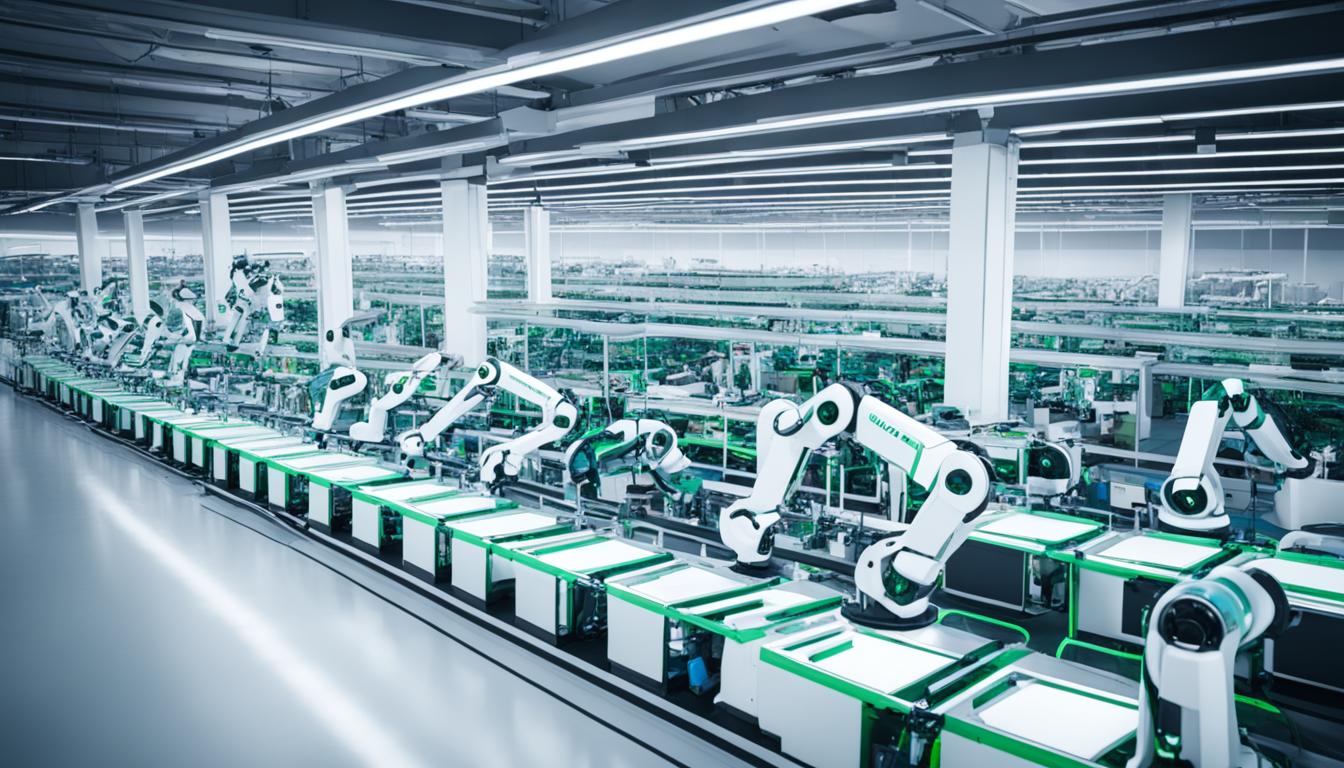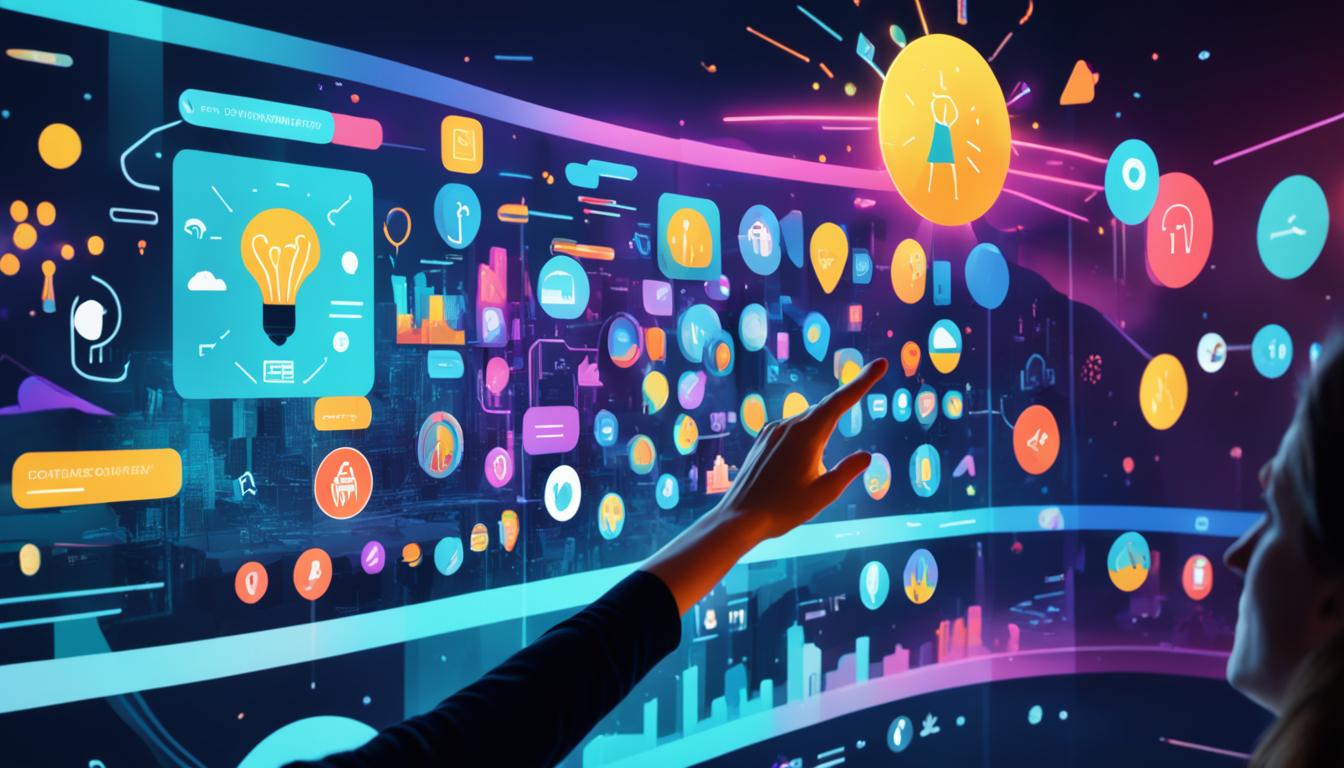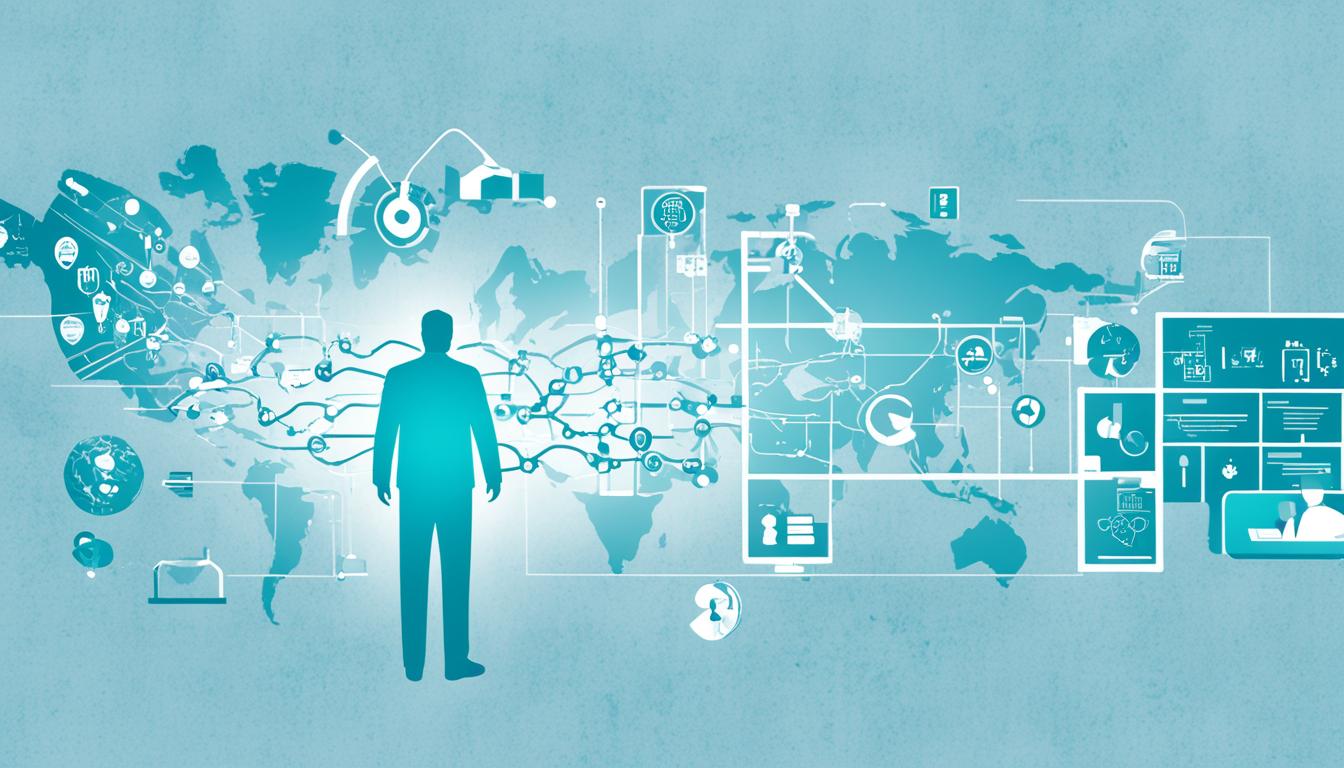As technology continues to advance at an unprecedented pace, one can’t help but wonder: What does the future of work hold? How will automation and artificial intelligence (AI) shape our workplaces and the jobs we perform? Will it be a world of limitless possibilities or a dystopian nightmare of mass unemployment?
These questions have been at the forefront of discussions and debates as automation and AI revolutionize industries across the globe. From manufacturing and healthcare to finance and customer service, the impact of automation and AI can already be seen in the automation of routine tasks and the introduction of AI tools for data analysis and decision-making.
Key Takeaways:
- The future of work will be shaped by automation and AI.
- Automation and AI are already transforming workplaces by automating routine tasks and enhancing data analysis.
- There will be job losses in some sectors but also new opportunities for those with programming and robotics skills.
- The demand for skills like creativity, critical thinking, and emotional intelligence will increase.
- Work culture is changing, with remote work and flexible schedules becoming more common.
Impact of Automation and AI on Jobs
The rapid advancement of automation and artificial intelligence (AI) technologies is set to significantly impact the job market in the coming years. While there will be job losses in certain sectors, automation and AI will also create new job opportunities and reshape the nature of work.
Already, routine tasks that require repetitive actions, such as data entry and assembly line work, are being automated, leading to job losses in these areas. However, this digital transformation also presents exciting prospects for workers who possess programming and robotics skills. These individuals will be in high demand as they play a crucial role in developing and maintaining automated systems.
Furthermore, jobs that require cognitive abilities, like data analysis and decision-making, will be profoundly influenced by AI tools that can process vast amounts of information. This will enhance productivity and enable more efficient decision-making processes across various industries.
“Automation and AI will have a profound impact on the workforce, resulting in both job losses and new opportunities for those who possess the necessary skills.”
For instance, the use of AI-powered chatbots in customer service can streamline interactions and provide immediate support to customers, while robotic exoskeletons can assist workers in physically demanding tasks, reducing strain and increasing productivity.
| New Job Opportunities | Job Losses |
|---|---|
| Technical experts in programming and robotics | Workers in routine, repetitive tasks |
| Data analysts and decision makers | Assembly line workers |
| AI specialists | Data entry personnel |
| Robotics engineers |
The impact of automation and AI on jobs will require workers to adapt and acquire new skills to remain competitive in the evolving job market. While roles requiring repetitive tasks may decline, those demanding creativity, critical thinking, and emotional intelligence will become increasingly valuable.
Overall, the impact of automation and AI on jobs is a complex phenomenon. It necessitates careful consideration of the potential job losses and the creation of new roles, as well as the need for individuals to upskill and reskill to meet the demands of the future workforce.
Shift in Skill Demands
The rise of automation and AI is bringing about a significant shift in the demands for skills in the workplace. As technology takes over routine and repetitive tasks, the value of skills that are difficult to automate, such as creativity, critical thinking, and emotional intelligence, is increasing. Employers are recognizing that these skills are crucial for driving innovation, problem-solving, and building strong relationships with customers and colleagues. As a result, future job skills will revolve around these key areas.
Firstly, creativity in the workplace will become increasingly important. Machines can execute predefined tasks efficiently, but they lack the ability to generate new ideas and approach problems from unconventional angles. Individuals with the ability to think creatively and come up with innovative solutions will be highly sought after. Creative thinking enables organizations to adapt to changing market dynamics, identify new opportunities, and stay ahead in a competitive landscape.
Secondly, critical thinking will be a vital skill for future job seekers. With the abundance of information available, the ability to analyze complex problems, gather relevant data, and make informed decisions will be invaluable. Critical thinkers are adept at examining options from different perspectives, evaluating potential risks and benefits, and making sound judgments. In an era where AI can provide vast amounts of data, individuals who can extract meaningful insights and apply them strategically will be highly valuable.
Lastly, emotional intelligence will play a crucial role in the workplace of the future. As automation takes over routine interactions, human connection and empathy become even more important. Emotional intelligence encompasses skills such as self-awareness, empathy, and effective communication. Employees with high emotional intelligence can navigate interpersonal relationships, collaborate effectively with others, and manage conflicts. This skill becomes particularly relevant in customer-facing roles and team environments where effective collaboration is essential.
“Creativity is intelligence having fun.” – Albert Einstein
Developing these skills will be essential for individuals aiming to thrive in the future workplace. Organizations will value employees who can bring fresh perspectives, think critically, and build meaningful relationships. The ability to adapt to this shift in skill demands will present new opportunities for career growth and job fulfillment.
| Skills | Role |
|---|---|
| Creativity | Graphic Designer |
| Critical Thinking | Data Analyst |
| Emotional Intelligence | Customer Service Representative |
As shown in the table above, specific job roles will place a high emphasis on these skills. Industries such as design, data analysis, and customer service will require individuals who can bring creativity, critical thinking, and emotional intelligence to their work to provide unique value to customers and solve complex problems.
Impact on Work Culture
The rise of automation and AI is revolutionizing work culture, leading to significant changes in the way we work and collaborate. Remote work and flexible schedules have become increasingly prevalent as these technologies enable employees to work from anywhere and have more control over their work hours. This shift in work culture has a profound impact on employees, businesses, and the overall work-life balance.
Remote work has become a popular arrangement for many employees, providing them with the flexibility to work from the comfort of their homes or any location of their choice. This allows workers to eliminate commuting time and expenses, leading to increased productivity and job satisfaction. Furthermore, remote work enables companies to tap into a larger pool of talent without geographical constraints, enhancing diversity and innovation within their teams.
Flexible schedules go hand in hand with remote work, allowing employees to adapt their work hours to suit their personal needs and preferences. This flexibility empowers workers to achieve a better work-life balance by accommodating family commitments, personal hobbies, and other obligations outside of work. By giving employees more control over their schedules, businesses can foster a healthier work environment and improve overall job satisfaction.
Remote work and flexible schedules provide employees with the freedom to work when and where they feel most productive, leading to increased motivation, engagement, and work-life balance.
However, the rise of remote work and flexible schedules also presents challenges for work culture. A sense of isolation and disconnection can be experienced by remote workers, who may feel disconnected from their colleagues and the overall company culture. To counteract this, businesses must prioritize maintaining a sense of community and connection among remote workers.
Regular video conferencing and team-building activities play a crucial role in fostering connections and maintaining collaboration among remote team members. By leveraging technology, companies can create virtual spaces for employees to interact and build strong relationships, ensuring that remote workers feel included and engaged. Additionally, cultivating a culture of open and transparent communication across the organization is essential to bridge the gap between remote and in-office employees.
The Impact of Remote Work and Flexible Schedules
The shift towards remote work and flexible schedules has numerous positive impacts on work culture:
- Enhanced work-life balance: Employees have the flexibility to manage personal and professional commitments, leading to reduced stress and improved overall well-being.
- Increased productivity: Remote workers often experience fewer distractions and have the freedom to design their work environments to maximize focus and efficiency.
- Attracting and retaining top talent: Offering remote work opportunities and flexible schedules can be a powerful recruiting tool, attracting highly skilled professionals who prioritize work-life balance.
The integration of automation and AI technologies has paved the way for innovative work culture practices that prioritize employee well-being and productivity. Remote work and flexible schedules demonstrate that the future of work is evolving towards a more flexible and adaptable approach, empowering employees to achieve a better work-life balance.
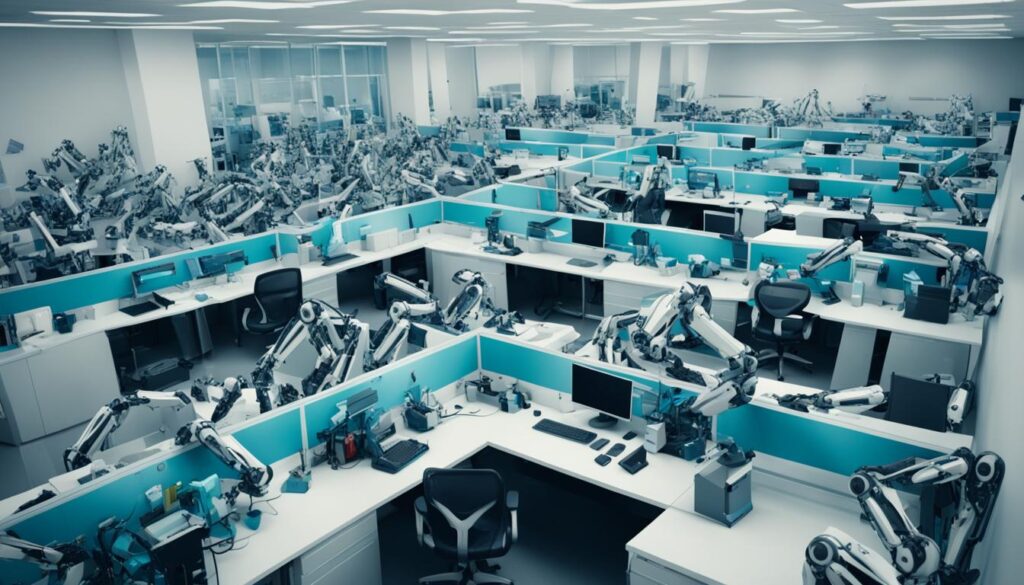
Embracing a New Work Culture
As businesses navigate the evolving work culture influenced by automation and AI, it is crucial to embrace and adapt to the changes:
- Implement policies and guidelines: Establish clear policies and guidelines that address remote work and flexible schedules to ensure consistency and fair treatment of employees.
- Invest in communication tools and technology: Provide remote workers with the necessary tools and technology to facilitate effective communication and collaboration, such as video conferencing platforms and project management software.
- Encourage social interaction: Foster a sense of community and camaraderie among remote and in-office employees through regular virtual team-building activities and inclusive communication channels.
- Promote work-life balance initiatives: Support employee well-being by offering programs and initiatives that promote work-life balance, such as wellness programs, flexible time-off policies, and mental health resources.
- Continuously adapt and improve: Regularly assess the impact of remote work and flexible schedules on work culture and make necessary adjustments to ensure employee satisfaction and overall success.
By embracing the opportunities presented by remote work and flexible schedules, businesses can create a work culture that values employee well-being, fosters productivity, and adapts to the changing demands of the future workplace.
Ethical Considerations
The rise of automation and AI in the workplace brings about important ethical considerations that need to be carefully addressed. One significant concern is the potential for bias in AI algorithms, which can lead to discriminatory outcomes. When AI systems are trained on biased data, they may perpetuate and amplify existing social biases, resulting in unfair treatment and discrimination against certain groups of people.
It is crucial for businesses to take proactive measures to ensure that their AI systems are designed and tested to minimize the risk of bias and discrimination. Ethical AI practices focus on creating inclusive and equitable algorithms that are free from bias and ensure fairness for all individuals, regardless of race, gender, or other protected characteristics.
Another ethical consideration arising from automation and AI is job displacement. As tasks and roles become automated, workers in certain sectors may face job losses or significant shifts in their employment prospects. This raises the question of responsibility for the workers affected by automation. Businesses have an ethical obligation to consider the impact on their workforce and provide support through retraining programs and opportunities for upskilling.
The lack of transparency in AI decision-making processes is also an ethical concern. AI systems often make complex and consequential decisions, such as determining loan approvals or assessing job applications. It is crucial for businesses to ensure that their AI systems are transparent and accountable, allowing individuals to understand how and why decisions are made. Transparent AI algorithms and decision-making processes can not only facilitate trust and acceptance but also enable individuals to challenge unfair or biased outcomes.
“Ethical considerations require businesses to address bias in AI algorithms, mitigate job displacement, and ensure transparency in AI decision-making processes.”
In summary, ethical considerations must be at the forefront of discussions and decision-making when implementing automation and AI technologies. Addressing bias in AI algorithms, providing support for workers affected by job displacement, and ensuring transparency in AI decision-making are essential steps toward creating an ethical and responsible future for the use of automation and AI in the workplace.
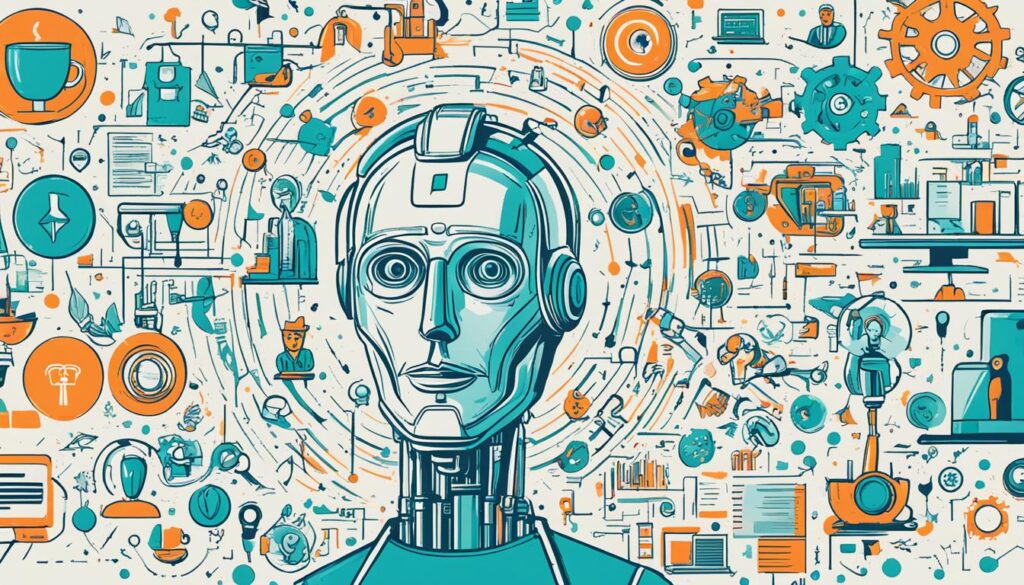
Accelerating Progress in AI and Automation
The progress in AI and automation is rapidly advancing, unlocking immense potential for businesses, the economy, and society. These technological advancements are redefining the boundaries of what machines can achieve, leading to the creation of innovative products and services that drive economic growth and address pressing societal challenges.
The deployment of AI and automation technologies has the capability to elevate the global economy to new heights. By streamlining processes, reducing labor costs, and increasing efficiency, businesses can experience a surge in productivity growth. This enhanced productivity not only translates into increased profits but also offers the possibility of creating higher-paying jobs and improving overall quality of life.
Furthermore, the integration of AI and automation has the potential to address significant societal challenges. In the healthcare sector, AI-powered systems can help analyze large amounts of data to improve diagnoses, develop tailored treatment plans, and enhance medical research. In combating climate change, automation technologies can optimize energy consumption, reduce waste, and contribute to sustainable practices. These advancements contribute to a more sustainable and equitable future for all.
However, as we continue to progress in AI and automation, it is essential to address the challenges that come with this powerful technology. Technical limitations, such as the need for vast amounts of quality data and computing power, need to be overcome to fully realize the potential of AI and automation. Additionally, there is a need to ensure that algorithms used in AI systems are void of bias, promoting fairness and inclusivity. Data privacy concerns must be addressed to maintain the trust of individuals and protect their personal information.
The adoption and implementation of AI and automation technologies varies across sectors and countries. While industries such as finance, automotive, and telecommunications have embraced these advancements, others are in the process of exploring their potential. It is crucial for businesses and policymakers to collaborate and create an environment that supports and encourages the widespread adoption of these transformative technologies.
Benefits of Accelerated AI and Automation Progress:
- Economic growth
- Increased productivity
- Addressing societal challenges
- Streamlining processes
- Enhanced efficiency
- Creation of higher-paying jobs
- Improved quality of life
“The progress in AI and automation is revolutionizing industries and has the potential to reshape our society and economy, paving the way for a more prosperous and sustainable future.”
Conclusion
The future of work is rapidly being shaped by the impact of automation and artificial intelligence (AI). While these technologies may lead to job losses in certain sectors, they also present new and exciting job opportunities. It is imperative for workers to adapt to this changing landscape by developing skills such as creativity, critical thinking, and emotional intelligence.
Furthermore, the work culture is undergoing a transformation with the rise of remote work and flexible schedules. This shift allows for greater work-life balance and opens up access to a wider pool of talent. However, it is essential to address ethical considerations such as bias in AI algorithms and the displacement of jobs.
Despite the challenges, the integration of automation and AI technologies offers immense potential for businesses, the economy, and society as a whole. By actively preparing for these changes and embracing the possibilities, we can create a future workplace that is productive, efficient, and equitable for all. The key lies in harnessing the power of automation and AI while also ensuring that the workforce transitions smoothly into the workplace of the future.
FAQ
How is automation and AI impacting jobs?
What skills will be in demand in the future workplace?
How is the rise of automation and AI impacting work culture?
What are the ethical considerations of automation and AI?
How is progress in AI and automation benefiting society and the economy?
What is the future of work and the impact of automation and AI?
Source Links
- https://www.uc.edu/news/articles/2023/05/the-future-of-work–how-will-ai-and-automation-affect-work.html
- https://www.mckinsey.com/featured-insights/future-of-work/ai-automation-and-the-future-of-work-ten-things-to-solve-for
- https://vocal.media/futurism/the-future-of-work-how-automation-and-artificial-intelligence-will-shape-the-workplace
